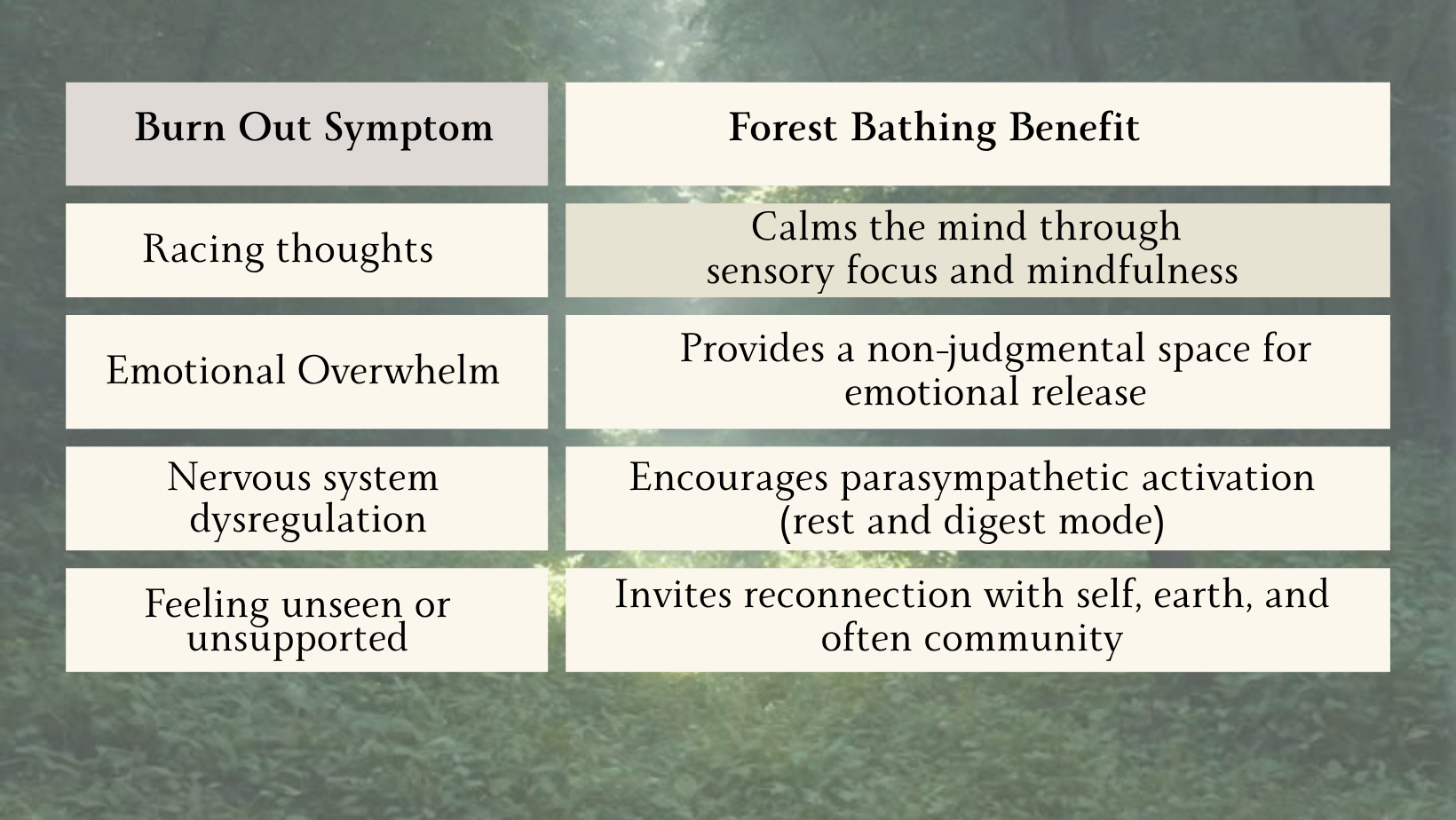Forest Bathing as a Sanctuary for Burnout and Overwhelm
In a world that rarely lets women rest, the forest offers something radical: stillness.
Every day, many of us are pulled in a thousand directions—caring for others, juggling responsibilities, managing households, building careers. Even the moments meant for rest are often filled with notifications, expectations, and invisible emotional labor. For women experiencing burnout or overwhelm, true restoration feels elusive.
But nature remembers a different way.
At Friends of the Forest, we believe that when we return to the embrace of the earth, something begins to soften inside us. Forest bathing—known in Japan as Shinrin-yoku—isn’t just a walk in the woods. It’s an intentional practice of slowing down, engaging the senses, and allowing nature to become a sanctuary for healing.
What Is Forest Bathing, Really?
Forest bathing doesn’t require hiking boots, a map, or even a destination. It’s the simple act of being in nature with full presence. Practitioners might spend 1–2 hours in a wooded area, walking slowly, breathing deeply, pausing often. There’s no agenda—only the invitation to notice.
Originating in Japan in the 1980s as a response to rising stress levels and overwork, Shinrin-yoku has since been studied for its profound health benefits. Research shows that forest bathing can significantly reduce cortisol levels (the stress hormone), lower blood pressure, and boost immune function (Park et al., 2010; Li, 2012).
But the deeper medicine lies beyond the physical.
The Forest as a Feminine Sanctuary
For many women, the forest feels like a return to something ancient and sacred. There’s no pressure to perform or produce. There are no mirrors reflecting society’s expectations. Just trees, wind, moss, and sky.
In this quiet space, the nervous system has permission to downshift.
Our bodies soften. The tightness in our chest loosens. The mind, once spinning, begins to settle into the rhythm of rustling leaves and birdsong. As author and eco-therapist Linda Buzzell writes, “Reconnecting with nature is not a luxury—it’s a necessity for psychological health.”
For those facing burnout, this connection can be life-giving.
Signs of Burnout — and What the Forest Offers
Burnout isn’t just being tired. It can show up as:
Emotional numbness or irritability
Chronic fatigue or insomnia
Loss of joy or creativity
Feeling disconnected from oneself or others
A deep sense of depletion, even after resting
While there’s no single cure, forest bathing offers a powerful balm:
A Guided Moment of Stillness
Imagine walking slowly beneath a canopy of oak and pine. You feel the sun filter through the leaves, dappling your skin. There’s no need to speak. You place your hand on the rough bark of a tree and exhale.
For a moment, you are not a caretaker, employee, partner, or planner. You are simply a woman held by the forest.
Here, you don’t have to explain your exhaustion. The land understands. The moss listens. The wind clears space.
Nature Doesn’t Rush — and Neither Should You
Modern life teaches us to hustle. But nature lives in cycles. Trees drop their leaves. Seeds rest underground. Nothing blooms all year—and neither should we.
Forest bathing reminds us that rest isn’t a luxury; it’s a rhythm. By aligning ourselves with nature’s pace, we begin to recover what burnout has stolen: our capacity to feel, connect, and be fully alive.
As Mary Oliver writes,
“You do not have to be good.
You do not have to walk on your knees
for a hundred miles through the desert, repenting.
You only have to let the soft animal of your body
love what it loves.”
An Invitation to Begin
If you're feeling overwhelmed, depleted, or unsure of where to turn—begin with a single breath under the trees. Join us for one of our gentle forest walks or seasonal rituals. There’s no pressure to talk. No need to be “on.”
At Friends of the Forest, you’ll find space to simply be—exactly as you are.
Come rest with us. Come remember yourself.
References:
Park, B. J., Tsunetsugu, Y., Kasetani, T., Kagawa, T., & Miyazaki, Y. (2010). The physiological effects of Shinrin-yoku (taking in the forest atmosphere or forest bathing): evidence from field experiments in 24 forests across Japan. Environmental Health and Preventive Medicine, 15(1), 18–26.
Li, Q. (2012). Effects of forest bathing trips on human immune function. Environmental Health and Preventive Medicine, 15(1), 9–17.
Buzzell, L., & Chalquist, C. (2009). Ecotherapy: Healing with Nature in Mind. Sierra Club Books.


